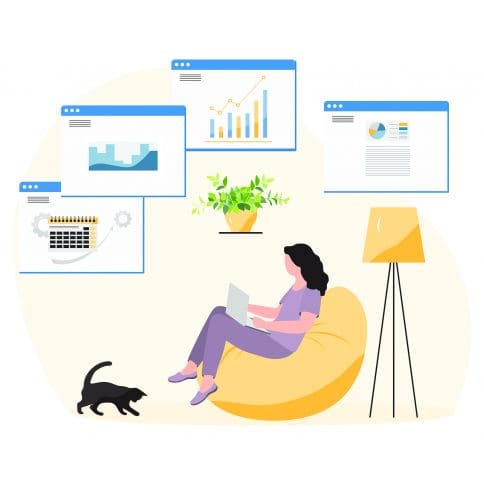
Remote work is the new normal. Not only that, but it will continue to be a popular option for companies that are adopting work-from-home policies. There’s overwhelming evidence that remote work increases productivity while simultaneously increasing employee happiness by as much as 20%. Working remotely clearly has positive benefits. However, with limitless distractions around, you still must practice keeping up a productive and steady workweek while also avoiding burnout. Whether you’re just starting a remote job or have been working one for years, odds are you’ve encountered some obstacles when trying to stay focused. Here are some remote work productivity tips to keep in mind.
1. Create a routine for yourself
Depending on your day-to-day work schedule, you’ll want to create a routine—and try to stick to it. Studies show that keeping a routine is important when trying to maintain healthy habits. It will help provide more stability and rhythm in your work life.
Also on Mediabistro


2. Schedule breaks in your calendar
Remote work offers flexibility and eliminates extra time spent commuting or chatting with fellow employees in the office, but that doesn’t mean you should spend all day at your desk and on your computer.
It’s easy to fall prey to the idea that you don’t have enough time for a break, but that’s simply not true. Scheduling breaks are important for your mental health and will boost productivity in return. Take a walk outside. Call a friend. Read a book for 30 minutes. Try meditation. Reward your hard work with a break.
3. Have a designated workspace
Maybe this is your first remote job, and you don’t quite have a home office yet. If you have space for it, create a spot solely for work.
If there’s not enough room in your apartment or home, look into memberships at coworking spaces. Studies show that these spaces increase productivity and an employee’s ability to thrive.
4. Limit digital distractions
We live in a world with countless distractions. Consider putting your phone on do not disturb during the hours you work and limit your screen time outside of work. Although you most likely have many distractions readily available at the touch of your fingertips, you can control when you’re using your time and attention elsewhere.
5. Try task batching
Have you ever heard of task batching? Task batching is when you group similar tasks together and complete them one at a time instead of sporadically. It’s proven to increase productivity because it lets our brains focus on one thing at a time, getting things done more efficiently.
6. Set weekly goals
Setting weekly goals for yourself—and then evaluating whether you completed these goals—will help you stay on track at your job, especially when working remotely. These goals can be smaller or larger. They could even be daily or monthly goals. Regardless, setting goals will help keep you on track.
7. Make lists
If you don’t create lists during your workweek, now could be the time to start. You could use the traditional pen and paper method or use a digital notebook such as OneNote, Evernote, or Notion.
8. Meal prep
Not having to go into an office means not having to worry about bringing or ordering lunch. Your kitchen may be just a few steps away, but meal prepping and planning out your meals will help your productivity by creating a routine in your day. It can help you gain a sense of how much time will be dedicated to your meals.
9. Set boundaries
Boundaries are crucial for remote work. Although you may be technically available during a certain time period each day, you don’t have to be readily available to your work friends or coworkers. Consider blocking off time in your calendar for your breaks so your coworkers know when you are available—and when you aren’t.
10. Use paid time off
Remote work has proven to increase happiness and flexibility. However, you should still use your given paid time off and completely unplug. It is proven to help you out in the long run—increasing productivity in return. Researcher Mark Rosekind of Alertness Solutions found that the respite effect of a vacation can increase performance by up to 80%.







